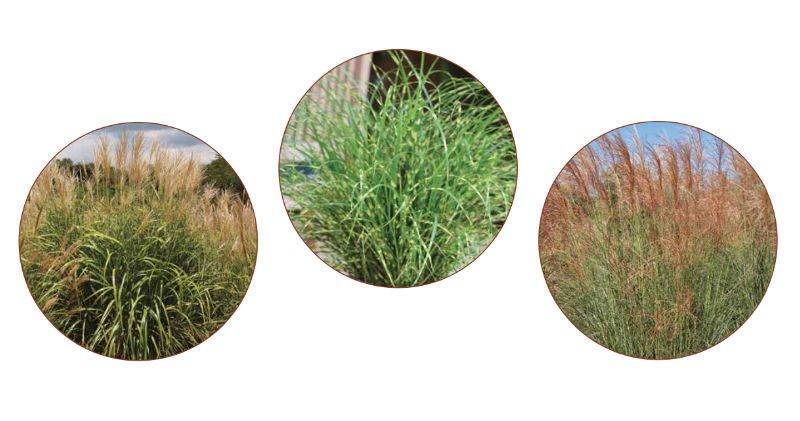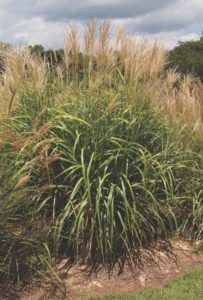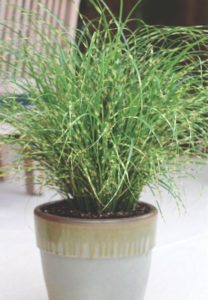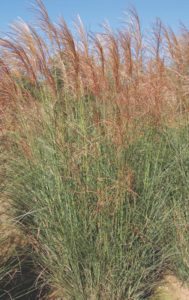
Expanded Offerings in Miscanthus
America’s favorite ornamental grass genus has acquired several promising new varieties. And more are just over the horizon.
Thanks to partnerships between university research and commercial growers, three fresh forms of Miscanthus sinensis are now coming available for planting in 2017. These varieties were bred specifically to be infertile, so gardeners and designers can forget any localized concerns about self-sowing.
Growers, retailers, designers and gardeners will want to make room for these two, from breeding at North Carolina State University (NCSU):
- ‘My Fair Maiden’. This is the most vigorous grower of the trio. With 6-foot columns of sturdy blades and flower plumes reaching to 9 feet, it forms a dramatic mass in the landscape. The solid green blades feature prominent white midribs.
- ‘Bandwidth’. Utterly unlike the above, this compact form stands just 3 feet tall at maturity — and that’s to the tops of the plumes. The name comes from the motherlode of broad gold bands that spangle its rich green foliage. The habit is tight and petite. The variety has performed well for three years in multiple trial locations, and has stood up well to the heat of Florida summers.
And for this one, from the University of Georgia (UGA):
- ‘Scout’. Graceful habit, slender blades and attractive fall color inspire comparisons to ‘Gracillimus’, an elegant, long-time industry standard. Plumes rise to about 6 feet. Foliage is solid green with a slender white midrib, taking on warm, vibrant fall colors as temperatures decrease.
Variations in Miscanthus

It bears mentioning that as grass genera go, miscanthus is already pretty rich and diverse. Major producers generally offer at least a dozen varieties, often more. But that hardly puts it in the same ballpark as other perennial categories like coreopsis, echinacea or heuchera, let alone hemerocallis or hosta, with literally thousands of named cultivars introduced over the years.
And unlike other perennials, where differences tend to be subtle, the variations in miscanthus can be dramatic. Heights range from cute little 3-footers like ‘Gold Bar’ and ‘Bandwidth’ all the way up to ‘Giganteus’, which stretches beyond the 10-foot mark. Blades may be solid green, longitudinally striped, or cross-hatched with gold bars, wide or narrow. Some cultivars bloom early, some late and many have strikingly beautiful fall foliage.
Miscanthus enjoys a prominent place in public plantings such as parks, commercial landscapes and especially golf courses. Maintenance is simple: Once dormant, plants can either be trimmed severely (just a few inches tall) or left to stand through winter. Many gardeners choose the latter option so they can enjoy the structure, movement and sound of the dry dormant foliage. Come spring, the previous season’s growth should be cut back hard to make way for new growth, taking care not to injure emerging blades.
Strides in Breeding

With a century of selections and introductions on the books, considerable winnowing has occurred. So the bar is already set pretty high, and to break into the market, new varieties need to offer something of significance. UGA Professor Emeritus Wayne Hanna is a renowned breeder whose repertoire encompasses tiny turf for golf courses, and towering tropical pennisetum. He set a goal to produce “desirable miscanthus that is highly seed-sterile over a broad range of environments.”
NCSU breeder Thomas Ranney says, “There is a reason why miscanthus is so popular. It is tough and adaptable with a diversity of sizes, textures and ornamental features. Infertile cultivars build on its strengths.” And according to Greg Soles of Darwin Perennials, “We’re in the early stages of developing infertile grasses to supplement existing varieties. To be introduced, they must bring real improvements to market. It’s not enough that they’re infertile.”
Darwin has identified six more varieties, also infertile, for potential introduction later in 2017. Final decisions will be made after a complete evaluation of overwintering performance in Zones 5 and 6. Liners will be available from Emerald Coast Growers and other licensed propagators.
Culture Notes

Miscanthus is a classic warm- season grass, growing most strongly as daylength and temperatures increase. Other popular genera that fall into this loose category, and which should respond well to the same general cultural practices, include pennisetum and panicum. Flowering occurs from mid-summer into autumn, depending on variety. Compared to panicum, miscanthus is less light-sensitive but prefers more feed.
Some growers choose to bring on warm-season grass containers indoors for early sales, using supplemental heat and extended- daylength lighting, to kick start emergence and growth. Others prefer to bulk containers outdoors in summer/fall, then overwinter for greater size and root mass in spring. Containers can be moved outdoors once danger of frost is past and nights are consistently warm.
To overwinter indoors, keep greenhouse temperatures above 23° F. Apply a fungicide drench, and remove dead foliage before plants go dormant.
In February, turn up heat and turn on the lights. Trim away remaining old foliage. Begin a preventive fungicide rotation when foliage emerges.
If overwintering outdoors, the degree of protection necessary varies with the hardiness zone. Miscanthus is generally hardy to Zone 5, with some varieties a bit more tender and others a bit more tough. Pots should be cleaned up and can then be placed pot-to-pot and covered with cloth. Some growers lay pots over on their sides.
Indoors or out, the overwintering goal is to prevent extreme freeze/thaw cycles. Uncover containers when foliage emerges, but be prepared to increase heat or re-cover for protection from hard frost.


 Video Library
Video Library 




















